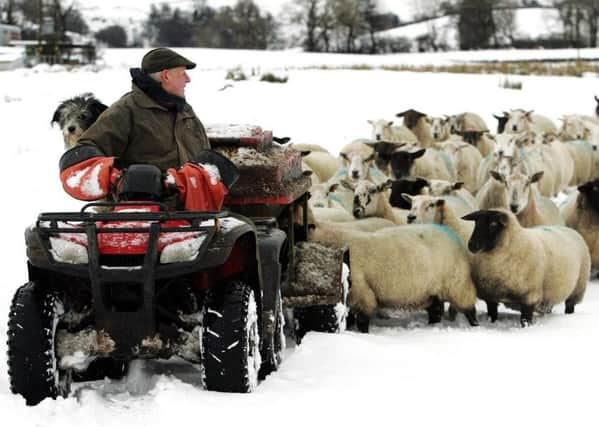What do we want? Cash. When do we want it? Now


I suspect the event – which is to highlight the economic chaos being wreaked on the entire rural economy because of the delays in farm support payments – will, in fact, be well-ordered, peaceful and polite.
But the fact that it is happening at all is a sign of the strength of feeling in Scottish farming, as many producers are forced to run up more debt and take on more borrowings in order to feed their stock and buy their seed.
Advertisement
Hide AdAdvertisement
Hide AdThe rest of the rural economy which is supported by the farming sector has been suffering too – as the spending capacity of the power-house of the countryside economy came to a juddering halt. Orders have dried up, new business has stalled, bills are unpaid and credit is being extended as the financial black-hole grows.
So there’s no getting away from the fact that the delay in the payment of support measures is responsible for the gaping £350 million hole in Scottish farming finances – and that of the wider rural economy which the industry supports.
The cause of the delays to the payments which are normally made in December have been widely argued – but the challenge of introducing a new IT system alongside the arrival of a highly complex set of common agricultural policy reform measures was always going to be extreme.
But while the farming industry hasn’t always enjoyed huge public sympathy – and the dangers of complaining about support levels which are not inconsiderable are well recognised – there is considerable support for the predicament of the industry at the moment. And with an election in the offing any sniff of a political failing is soon pounced on by parties not in power.
Whichever way you bake it, though, the IT system – variously described as flawed, incompetent and plain not fit for purpose – together with an overly cautious attitude from the Scottish Government lies at the heart of the problem.
Last week saw some decisive action taken though – when the new system was sidelined and the old one cranked back into life to get a substantial proportion of the less favoured area payments, set to get caught up in the log-jam, out to farmers in hill and uplands in March.
But, as was immediately pointed out by NFU Scotland, if the old system was capable of getting LFASS payments out, it should have been harnessed to do the same for the rest of the backlog as well.
It wouldn’t be able to complete all the new compliance checks required by Brussels – but a slightly less risk-averse attitude from the Scottish Government could overcome this at a stroke – and payments could be made based on best estimates, leaving the rest of the sorry mess to be sorted out later.
Advertisement
Hide AdAdvertisement
Hide AdEU fines might be incurred but if there was any justice in the world – and if the contract had been drawn up properly – these should be borne by the IT company which has failed to deliver a system capable of coping with what was asked of it.
Certainly, at the moment farmers and the entire rural economy are suffering severe knock-on consequential penalties. Plus it now looks likely that, at the current rate of progress, a fine will be on the cards anyway.
A look around the rest of Europe also shows that Scotland is far from being alone in struggling to cope with the new CAP.
And since it’s very unlikely that the payments won’t all be out the door by the time we all decide where to put our crosses at the EU referendum, some flexibility on the part of the EU would be to its own benefit.
So, as won’t be chanted at the rally: “What do we want?”
“A proper contractual agreement which would see IT companies working for state departments held to task – alongside a show of some cojones from the Scottish Government and some legislative flexibility from the EU – right now!”
